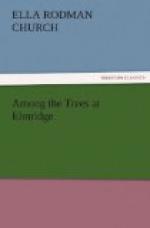“I shouldn’t think the camphor was worth all that trouble,” said Malcolm; “it don’t seem to amount to much, any wary.”
“It is more valuable than you suppose,” replied Miss Harson; “for, besides preserving furs and woolen fabrics from the devouring moth, it protects the contents of cabinets and museums from the attacks of the minute creatures that prey upon the dried specimens of the naturalist. Not any of the insect tribe can endure the powerful scent of the camphor, and they either retreat before it or are killed by it. But its principal value is in medicine. It is used both internally and externally. It acts as a nervous stimulant, and is a favorite domestic remedy.—So you see, Malcolm, that camphor really amounts to a great deal, and we could not very well do without it.”
“How can people tell when there is any camphor inside the tree?” asked Clara.
“They cannot tell,” was the reply, “until the trunk is split open, although a tribe of men in Sumatra say that they know before-hand, by a kind of magic, which is the right tree to cut down. But the beautiful, stately tree is often wasted in vain, and after all their hard work the camphor-seekers find the cavities of the split-up trunk filled with a thick black substance like pitch instead of the pure white camphor.”
“Poor things!” said Edith, pityingly; “that’s too bad.”
“Camphor is found in many trees and shrubs,” continued her governess, “but in all others except the camphor tree of Sumatra and Borneo it has to be distilled from the wood and roots. The camphor-laurel, which is about the size of an English oak, is the most important of these trees. It grows abundantly in the Chinese island of Formosa, and ’camphor mandarin’ is the title of a rich Chinaman who pays the government for the privilege of extracting all the camphor, which he sends to other countries at a large profit. Every part of this tree is full of camphor, and the tree gives out, when bruised, a strong perfume.
“The European bay tree, which is more like an immense shrub, is also a member of this singular tribe, and its leaves have the strong family flavor. They were used in medicine, as well as the berries, before the camphor-laurel became known in Europe; in the time of Queen Elizabeth the floors of the better sort of houses were strewed with bay-leaves instead of being carpeted as now. The bay was an emblem of victory in old Roman times, and victorious generals were crowned with it. A wreath of this laurel, with the berries on, was placed on the head of a favorite poet in the Middle Ages, and in this way came the title ‘poet-laureate’—laureatus,’ crowned with laurel.’
“Do you remember,” continued Miss Harson, “the tall, straight tree that I showed you yesterday when we were out in the woods—the one with a fluted trunk? What was its name?”
“I know!” said Malcolm, quite excited. “Think of the seashore! Beach! That’s what I told myself to remember.”




